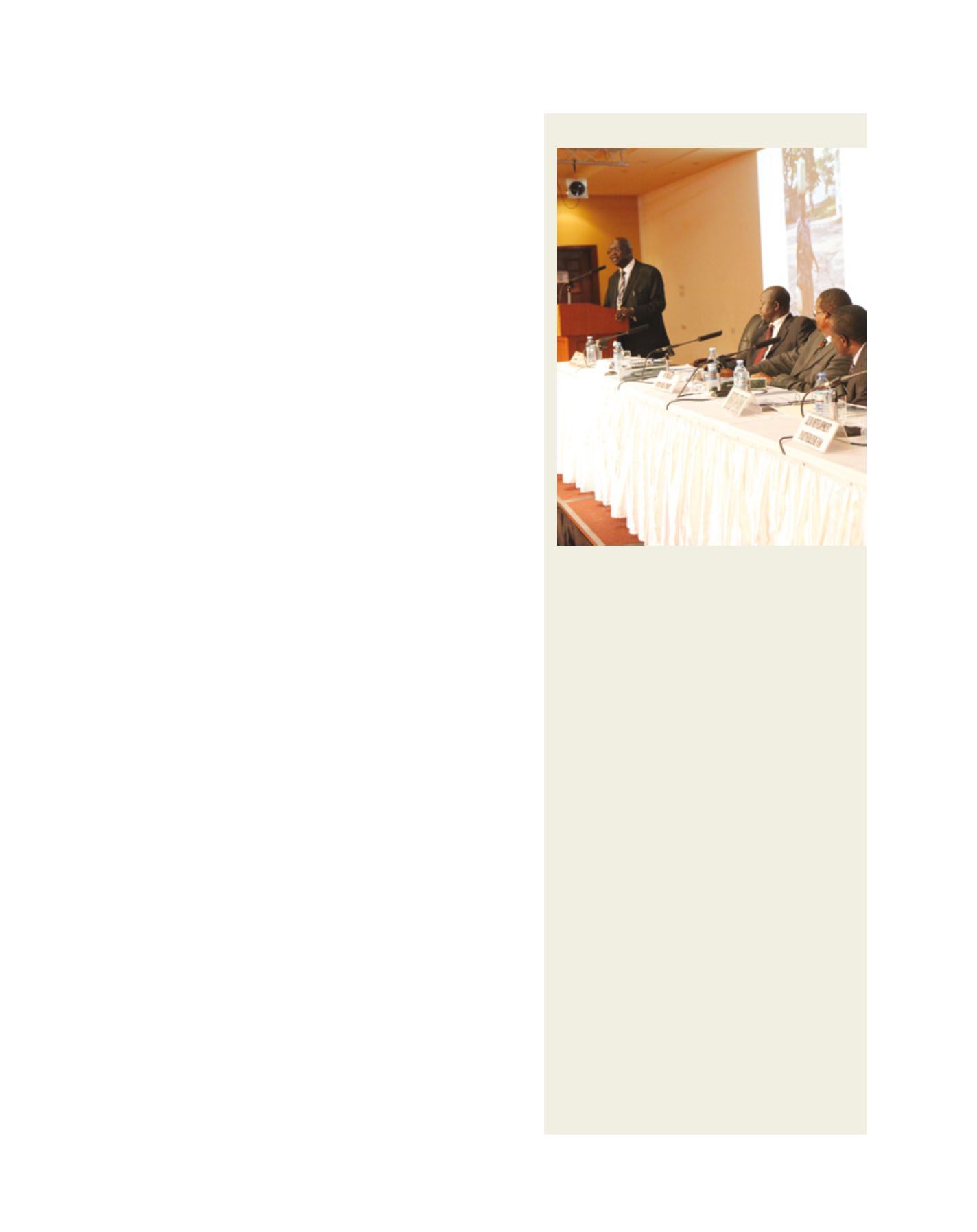

[
] 160
F
inancing
C
ooperation
as an important means of supporting Africa’s development and is
collaborating with the African Union Commission, the United
Nations Economic Commission for Africa and the New Partnership
for Africa’s Development (NEPAD) Planning and Coordinating
Agency in the development and implementation of the Programme
for Infrastructure Development in Africa (PIDA). The water-related
components of the programme target the development of multi-
purpose dams, exploitation of extensive transboundary aquifers,
and capacity building for Africa’s lake and river basin organizations
so they can plan and develop hydraulic infrastructure to improve
Africa’s water and food security. PIDA allows for developing the
continent’s huge hydropower potential for its industrial transforma-
tion, as well as increasing access to safe drinking water for addressing
health, education and gender-related issues. Water infrastructure is
also contributing to mitigation of the water-related challenges posed
by climate change and variability.
In order to address the very low access rates for rural water
supply and sanitation (RWSS) services, AfDB initiated the Rural
Water Supply and Sanitation Initiative (RWSSI) in 2003. RWSSI is
a regional initiative which provides a common collaboration frame-
work between African governments and international development
partners for resource mobilization and investment to meet the MDGs
and Africa Water Vision 2025 targets. By the end of 2012, AfDB had
invested about US$1.3 billion in financing 37 rural water supply and
sanitation programmes in 27 countries. Several donors are support-
ing the initiative through their bilateral or multilateral channels, and
an estimated US$4.2 billion has been leveraged through the support
of other donors and the African governments. This collaborative
effort has so far contributed to bringing access to rural water supply
and sanitation to 56 million and 41 million people respectively.
Regional water initiatives supported by AfDB include those
under the East African Community, the Economic Community
of West African States, the Intergovernmental Authority on
Development, the Southern African Development Community
(SADC) and all the major river and lake basins (Nile, Volta,
Congo, Niger, Senegal, Gambia, Lake Chad and Lake Victoria).
These initiatives involve developing integrated water resources
management (IWRM) plans, financing feasibility studies, capac-
ity building activities and investments. AfDB is leading resource
mobilization initiatives for a number of regional and subregional
entities such as the Permanent Inter-State Committee for Drought
Control in the Sahel and the Lake Chad Basin Commission. In
East Africa AfDB is collaborating with the United Nations Human
Settlements Programme (UNHABITAT) and the Lake Victoria
Basin Commission through a major regional water and sanitation
programme that targets 15 urban centres in the immediate vicinity
of the lake in the five riparian countries. The bank is also working
with SADC to support three of its member countries (Tanzania,
Zimbabwe and Mozambique) through the Shared Watercourses
Support Project for Buzi, Save and Ruvuma River Basins.
Collaboration at country level
At the country level, cooperation with regional member countries
(RMCs) and their development partners plays an important role in
the way AfDB supports the water sector. Many of the 62 water and
sanitation projects in 35 countries with about US$3 billion of bank
financing in the current portfolio were developed in collaboration
with other donors or are co-financed with them. Through its decen-
tralized structure and in line with the Paris Declaration principles
AfDB collaboration at country level
Mali
– AfDB currently leads a group of 14 donors
within the consultative framework that brings together
government and donors to jointly support the national
water and sanitation programme (Programme Sectoriel
d’Eau et Assainissment). The framework is based on a
three-year rolling medium-term expenditure framework
that establishes the financing required to meet sector
objectives, takes into account existing government and
donor commitments and identifies the financing gaps to
be addressed by partners.
Sierra Leone
– AfDB is a member of the Development
Partners forum, which enables information sharing
and discussion of issues regarding support to Sierra
Leone’s development agenda, including the water and
sanitation sector. The bank is now working closely
with the Government, the Department for International
Development (DfID), the Global Environment Fund and
RWSSI Trust Fund partners to support a Rural Water
Supply and Sanitation Project with an estimated cost of
US$43 million. DfID’s funding will be channelled through
AfDB’s Fragile States Facility.
Tanzania
– AfDB and other partners (KfW, World
Bank, Agence Française de Développement, DfID,
UNICEF, European Union, Millennium Challenge
Corporation, Water Aid and the governments of Belgium,
Japan, South Korea and Norway) are supporting the
water sector SWAp through the Government’s Water
Sector Development Programme. AfDB funding is
earmarked for rural water supply and sanitation.
Uganda
– within Uganda’s broader donor
coordination framework and SWAp for the WSS sector,
AfDB is a member of the Water and Sanitation Sector
Development Partners Group which enables the bank, in
collaboration with several other development partners,
to jointly enhance the efficiency, effectiveness and
coherence of their assistance to the sector. AfDB is
currently involved in joint technical sector reviews for the
Uganda Water and Sanitation Project and is co-financing
the Kampala Sanitation Programme with KfW.
A joint sector review meeting in Uganda
Image: AfDB


















